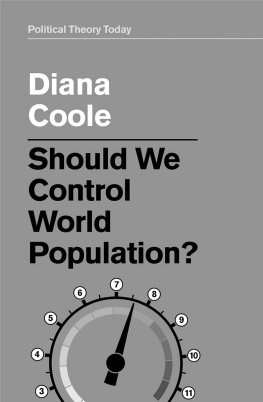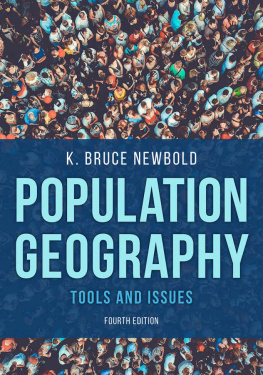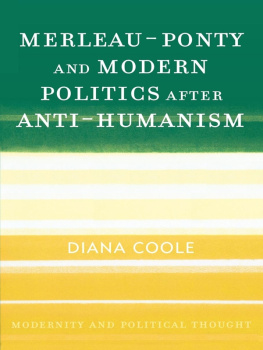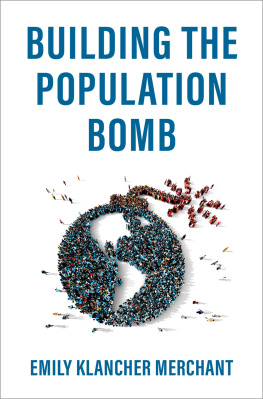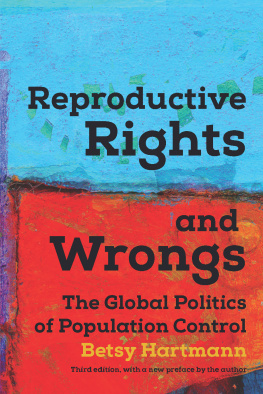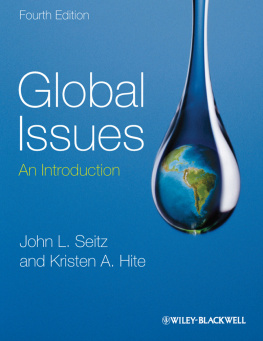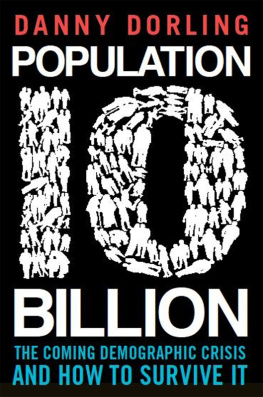Contents
Guide
Pages

Political Theory Today
Janna Thompson, Should Current Generations Make Reparation for Slavery?
Christopher Bertram, Do States Have the Right to Exclude Immigrants?
Diana Coole, Should We Control World Population?
Should We Control World Population?
Diana Coole
polity
Copyright Diana Coole 2018
The right of Diana Coole to be identified as Author of this Work has been asserted in accordance with the UK Copyright, Designs and Patents Act 1988.
First published in 2018 by Polity Press
Polity Press
65 Bridge Street
Cambridge CB2 1UR, UK
Polity Press
101 Station Landing
Suite 300
Medford, MA 02155, USA
All rights reserved. Except for the quotation of short passages for the purpose of criticism and review, no part of this publication may be reproduced, stored in a retrieval system or transmitted, in any form or by any means, electronic, mechanical, photocopying, recording or otherwise, without the prior permission of the publisher.
ISBN-13: 978-1-5095-2344-3
A catalogue record for this book is available from the British Library.
Library of Congress Cataloging-in-Publication Data
Names: Coole, Diana H., author.
Title: Should we control world population? / Diana Coole.
Description: Medford, MA : Polity Press, [2018] | Series: Political theory today | Includes bibliographical references and index.
Identifiers: LCCN 2018000380 (print) | LCCN 2018005762 (ebook) | ISBN 9781509523443 (Epub) | ISBN 9781509523405 (hardback) | ISBN 9781509523412 (pbk.)
Subjects: LCSH: Population policy--Moral and ethical aspects. | Reproductive rights. | Birth control. | Overpopulation.
Classification: LCC HB883.5 (ebook) | LCC HB883.5 .C66 2018 (print) | DDC 363.9--dc23
LC record available at https://lccn.loc.gov/2018000380
The publisher has used its best endeavours to ensure that the URLs for external websites referred to in this book are correct and active at the time of going to press. However, the publisher has no responsibility for the websites and can make no guarantee that a site will remain live or that the content is or will remain appropriate.
Every effort has been made to trace all copyright holders, but if any have been overlooked the publisher will be pleased to include any necessary credits in any subsequent reprint or edition.
For further information on Polity, visit our website: politybooks.com
Introduction
Since 1950, the worlds population has trebled, from around 2.5 billion to more than 7.5 billion in 2017. It is projected to exceed 9.7 billion by mid-century, rising to around 11.2 billion by 2100. Given a simultaneous rise in living standards and in environmental degradation, it seems timely to ask whether such numbers are sustainable. Demographic change can have enormous national as well as global impacts, especially if a population is growing (or diminishing) significantly. Higher densities affect everyday lives; more (or fewer) people may place substantial strains on social and ecological services; shifts in the ratio between births and deaths alter a countrys age profile and economic prospects. In short, demography matters. But should governments therefore try to control trends that are judged sub-optimal? This became one of the most bitterly contested issues of the twentieth century. Today, the outstanding question is not whether massive increases will continue indefinitely but, rather, whether the pace of fertility decline and slowing growth rates now witnessed virtually everywhere will, if left untended, yield a sustainable population within the constraints of the biosphere. If not, strenuous political efforts may be needed to achieve it. But can they be justified ethically?
Population control is commonly (although not necessarily) identified with reducing, even reversing, population growth. This only emerged as a serious issue during the eighteenth century, especially in old countries like Britain that were already considered over-peopled. Industrialization showed that resources were more elastic than previously imagined. The idea of ending worldwide expansion of human numbers only emerged during the mid-twentieth century, with the appearance of new ecological sensibilities that recognized planet Earth as a single but fragile life-support system on which billions now depended. In overdeveloped nations, evidence of environmental deterioration was attributed to the combination of a post-war baby boom and rising production and consumption; in underdeveloped nations, rapid population growth was understood as an obstacle to development and a catalyst for an impending humanitarian crisis. The 1960s and 1970s were the heyday for heroic population-control narratives and policy initiatives that have since been disavowed as coercive. This is the core concern that any new intervention will need to address.
Despite the topic remaining toxic, there are renewed claims that world population growth is contributing significantly to a planetary environmental crisis and calls for government action to reduce it. The terminology of population control is absent from this contemporary discourse but a goal of population stabilization is not. In fact, most nations do practise interventionist policies: a majority of the 197 countries surveyed by the United Nations (UN) in 2013 reported policies for raising or reducing growth rates, primarily through influencing fertility behaviour. The population question has not been much discussed over recent decades but, as it re-emerges, it seems important to revisit and update arguments, taking into account the unprecedented biophysical circumstances, altered geopolitical relationships and novel discursive resources of the twenty-first century.
Three principal variables determine demographic trajectories: fertility, mortality and migration. Public interventions designed to increase life expectancy are commonplace and seldom questioned, although debates about voluntary euthanasia and the right to die are still in their infancy. Certainly, measures designed to limit numbers by raising the death rate would be universally reviled. Population control is primarily interested in fertility rates. Future population growth is highly dependent on the path that future fertility will take, as relatively small changes in fertility behaviour, when projected over several decades, can generate large differences in total population. Population control is defined in this book as a policy regime designed to modify fertility trends through deliberate interference in reproductive behaviour, with the aim of influencing demographic outcomes. The total fertility rate (TFR) is the crucial variable here: in simplified terms, it refers to the average number of children a woman will bear over her lifetime. Over time, replacement-level TFR (of 2.1) results in a stable population as each generation replaces itself. To modify the TFR, population controllers must influence individuals reproductive behaviour. This is not just a complicated undertaking; it is also profoundly controversial. Liberal values of freedom, autonomy and human rights are entangled here with contested definitions of sexuality, gender roles and identities, family norms and embodiment, as well as with ideological disputes over the role of the state and its powers.
Migration, finally, is a somewhat different demographic phenomenon since it refers to the mobility of existing peoples. Migration can nonetheless affect local fertility and death rates. Some environmentalists and security experts warn that increasing numbers may themselves cause mass migrations or life-threatening conflicts. Because of migrations national impact on other demographic variables, immigration and emigration are widely used as policy levers to address perceived size or age imbalances. Regulating peoples movement, especially by enforcing national border controls, is both common and contested, although this is not conventionally understood as population control.

